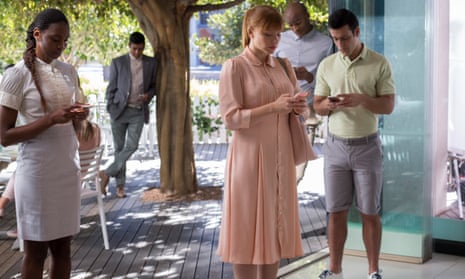I love a television show that makes people talk, and particularly one that makes its viewers ask the big questions. The new sci-fi western drama Westworld is slow, pretentious, confusing, and my new favourite, with its grandiose concerns about playing God and how sentient a sentient creation should be. Tapping into a worry first planted in me by an illicit sleepover viewing of Terminator 2, it is a wide-ranging exploration of what happens when we evolve too far, and what happens if we give robots guns. If you are watching it and not starting to eye up your Fitbit with suspicion, then you are not paying attention.
Likewise with the new episodes of Black Mirror on Netflix, which seems to have caused people to start noticing their daily Black Mirror moments. Did you give star ratings to that book you bought on Amazon, in the same way that they reviewed people in the first episode? Did you experience feelings of loss and disappointment because an Instagram shot of a very funny letter to your local newspaper did not get as many likes as you thought it deserved? Played a stunningly realistic session of Uncharted 4 where the tropical trees looked as if they could have been photographs? Fallen in love wearing stonewashed denim? Black Mirror, Black Mirror, Black Mirror.
I would love to find the core truth about my own relationship to technology within these modern moral fables, but ultimately, I have realised that my issues are far more basic. All I want is for technology to stop trying to be my friend, and to give me a bit of personal space.
There is another television show that was prescient about the demands of technology on our day-to-day lives – the sitcom Absolutely Fabulous. In 1995, when it was at its peak, they aired an episode that still rings true, 21 years later. Jennifer Saunders’ Eddy gets herself the latest gadget, a personal organiser/digital diary that beeps at her when she is supposed to wake up, eat, exercise, have meetings, etc. Its primary function is to schedule her every activity and movement. At the start of the episode, it is the height of luxury and indulgence, the future. Near the end, Eddy can’t take the pressure of being told where to be and what to do every five seconds. She snaps, and chucks it out of the window, yelling: “Give me back my life.”
We are being hassled and nagged by the technology that is supposed to make our lives better and more convenient. Facebook says Hello in the morning and asks us how we are. But its attempts at chirpy human touches aren’t making us more connected (and besides, none of the humans I know are chirpy); they are making me feel suspicious about why it needs to know, and bad about neglecting it. And the reason I have little desire to tell Facebook how I am at the moment is mainly because its current favourite thing to do is to remind me of how awful I was back in 2007, when I wrote in the third person and mainly complained about feeling unwell. Using On This Day, a hideous ghost of Christmas past, Facebook reminded me that a decade ago, I felt the need to tell my feed that I had bought a ukulele. Worse, it reminded me that a decade ago, I bought a ukulele. It knew what it was doing.
Online shopping, too, is becoming less a convenient way of getting what we need while living a busy life, and more a constant act of evading the shame of targeted ads based on a whim we might once have had. Ebay’s creepy habit of sending an email of a listing you looked at once, telling you that it is still for sale if you are tempted, is just an unnecessary reminder of late-night internet follies. No, I don’t want to buy a Princess Diana T-shirt, I just wondered if such a thing existed, and in what form, and why.
If AbFab’s Eddy thought a timed alarm was stressful, imagine how she would survive in an age of health apps. I tried a sleep-tracking app for the first time recently, which silently worked away under my pillow and told me that I slept badly, which made me worried enough about sleeping badly to sleep even more badly. I don’t want MyFitnessPal to tell me that I’ve exceeded my sugar allocation for the day by 10am, nor do I want to lie to it about having had one biscuit instead of three. I’m not ducking sorry and I already bought that saucepan, which isn’t as good as the fancy one you’re showing me again, so thanks for reminding me that I made a mistake by scrimping.
Our phones are growing ever more useful with each update, taking care of more of what they think we need, and our browsers and algorithms are becoming more intuitive, but the clinginess is starting to become unbearable. Technology is a needy puppy that won’t let you go into the next room without nipping at your ankles; it’s a constant request for more, more, more. But as I said, I have been greatly enjoying this new series of Black Mirror, recommended to me by my close personal friend who knows everything about me, Netflix.

